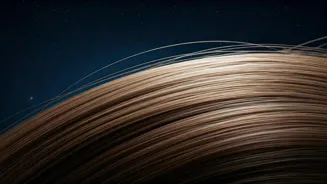Origins of Belief
The age-old practice of aligning hair care with lunar cycles stems from a deep-seated connection humans have had with nature. It's a belief rooted in observations
of how the moon influences tides, animal behavior, and even plant growth. These observations, passed down through generations, led people to speculate if the moon's energy also affected the human body, especially the growth cycles of hair. People believed the different phases, from the new moon to the full moon, possessed unique influences. The new moon period was thought of as ideal for cleansing and rejuvenation, while the full moon's gravitational pull may have been associated with increased absorption of nutrients. These beliefs were common in ancient cultures like Ayurveda, where natural rhythms were deeply respected.
Moon Phases Explained
The moon's phases change throughout a lunar month, which typically lasts about 29.5 days. It begins with the new moon, when the moon is invisible to us because it is between the Earth and the sun. As the moon moves in its orbit, a sliver of light appears, and we enter the waxing crescent phase. After this is the first quarter, where half the moon is illuminated. The waxing gibbous phase then shows more than half of the moon. Then comes the full moon, where the entire lunar surface is lit up. After this, the phases reverse, and the moon begins to wane through the waning gibbous, third quarter, and waning crescent phases before returning to the new moon. Each of these phases is connected to different aspects of nature's cycles. For example, farmers often plant and harvest crops based on the moon's phases, believing that certain phases offer optimal conditions for growth and yield.
Does it Affect Hair?
While the belief that the moon influences hair growth has been around for centuries, scientific evidence backing these claims is still limited. Studies are still needed to find any clear evidence. Some argue that the moon's gravitational pull is too weak to significantly affect biological processes in the human body. However, some believe that the influence isn't as direct as a pulling force. Instead, it may relate to the subtle ways it influences other bodily systems like the circulatory or lymphatic systems. For example, people believe that hair grows faster and stronger during the waxing phase of the moon, when the moon's energy is building, and cutting hair during this time is believed to promote faster growth. Conversely, they believe that the waning phase is better for trimming to slow down growth and maintain shape. There's no definitive scientific proof to confirm these relationships.
Best Times, or Myth?
Determining the 'best' time for hair care based on moon phases is where the myth aspect really emerges. Proponents of lunar hair care believe certain phases enhance specific results. As mentioned, people claim that cutting hair during the waxing phases, particularly right before a full moon, encourages faster growth, and that cutting hair during the waning phases reduces growth and maintains style. They might suggest using specific treatments or doing certain activities during particular phases. For example, they may suggest applying a hair mask during a new moon to detoxify the scalp, or giving the hair a deep conditioning treatment during a full moon when nutrients are believed to absorb better. But it's important to note that these suggestions are rooted in traditional beliefs and not science. Scientific evidence is still lacking, so it remains a matter of personal faith and belief.
Tips for Hair Growth
Whether you subscribe to the moon phase theory or not, certain practices consistently promote healthy hair growth. Firstly, you need a balanced diet. Protein, vitamins (like biotin, vitamin D, and vitamin E), and minerals are crucial for hair health. Make sure to incorporate nutrient-rich foods into your diet. Then, focus on regular scalp massages, which boost blood flow to the hair follicles, and thereby, stimulate growth. Use gentle hair care products and avoid harsh treatments like excessive heat styling, bleaching, or tight hairstyles, as these can weaken and damage hair. Staying hydrated is also key as it keeps the hair moisturized and strong. Moreover, consider using hair-friendly supplements, such as biotin, after consulting with a professional. Consistency in these practices, regardless of moon phase, is crucial.
Scientific Evidence Available?
Research on the direct impact of moon phases on hair growth is limited, and there isn't any solid scientific proof to support the theories. Much of the information is based on traditional beliefs, anecdotal evidence, and the perceived relationship between the moon's cycles and other natural phenomena. Scientists generally focus on more well-established factors affecting hair growth, such as genetics, nutrition, hormonal changes, and overall health. These factors have a significant impact on hair growth, but the moon's influence has not been clearly established. To thoroughly understand the relationship between the moon phases and hair growth, rigorous scientific research is needed. This research would involve carefully designed studies that control for the many factors that affect hair growth while isolating and measuring the influence of lunar cycles.
When to Ignore?
It's perfectly acceptable to approach the topic of lunar hair care with a critical perspective. If you find that the idea of the moon's phases affecting hair growth feels unsubstantiated or distracts you from more established hair care practices, then feel free to ignore it. The most effective hair care routine is about consistency, good habits, and using scientifically backed methods, regardless of what phase the moon is in. Focus on the fundamentals: eating a balanced diet, using the right products, and practicing gentle care. Those are the core things that will lead to healthy hair. You can also take the knowledge about the moon with a pinch of salt. It is important to approach any advice with a balanced perspective. If the concept brings you peace or makes you feel more connected to nature, you can choose to incorporate it into your rituals.













